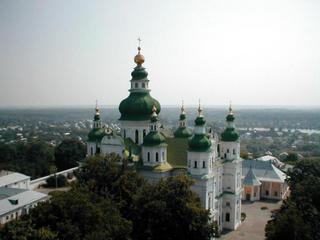Mostly Mozart and Bortniansky
"Exploring the connection between Mozart and Russia is a dubious proposition, because there was none. Not only did Mozart never visit the place, he knew next to nothing about it. But his music was embraced there, thanks in part to the Ukrainian composer Dmitri Bortniansky, a Mozart contemporary who was steeped in Italian music, studied opera in Italy and introduced works like Mozart's Requiem to the imperial court in St. Petersburg.
It was a musically rewarding idea to pair a performance of Bortniansky's inventive and urgent a cappella Te Deum with Mozart's Mass in C minor. To sing the Russian Orthodox work the festival had utterly authoritative interpreters in the Patriarchate Choir of Moscow, an all-male ensemble of 12, conducted by Anatoly Grindenko. And as long as this renowned Russian choir was on hand, why not have them do what they do best? So they preceded the Bortniansky work with a half-hour of Russian sacred music mostly from the 16th and 17th centuries."
Anthony Tommasini A Moscow Choir Fills In for Mozart's Ignorance of Russia New York Times August 29, 2005.

Slavonic Orthodox Cathedral (18th c.) Chernigiv, Ukraine
*
There are monuments to Dmitri Bortniansky in his hometown of Hlukhiv, Ukraine, and at the Cathedral of Saint John the Divine, in New York City, where he stands among the twelve composers who contributed most to the development of religious music.
It was a musically rewarding idea to pair a performance of Bortniansky's inventive and urgent a cappella Te Deum with Mozart's Mass in C minor. To sing the Russian Orthodox work the festival had utterly authoritative interpreters in the Patriarchate Choir of Moscow, an all-male ensemble of 12, conducted by Anatoly Grindenko. And as long as this renowned Russian choir was on hand, why not have them do what they do best? So they preceded the Bortniansky work with a half-hour of Russian sacred music mostly from the 16th and 17th centuries."
Anthony Tommasini A Moscow Choir Fills In for Mozart's Ignorance of Russia New York Times August 29, 2005.

Slavonic Orthodox Cathedral (18th c.) Chernigiv, Ukraine
*
There are monuments to Dmitri Bortniansky in his hometown of Hlukhiv, Ukraine, and at the Cathedral of Saint John the Divine, in New York City, where he stands among the twelve composers who contributed most to the development of religious music.


0 Comments:
Post a Comment
<< Home